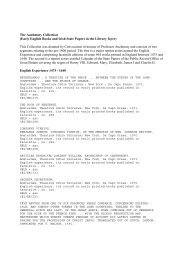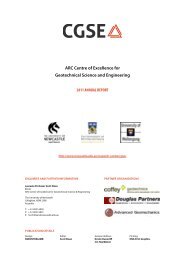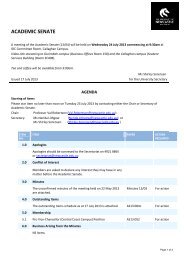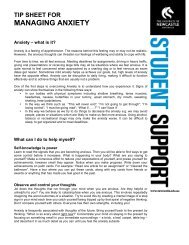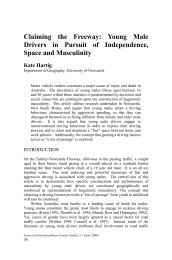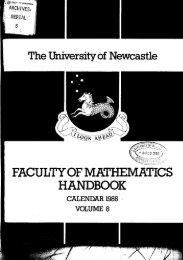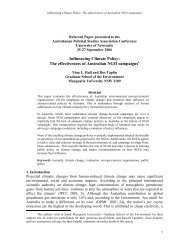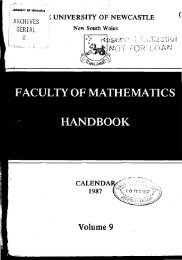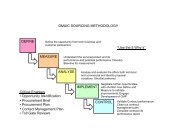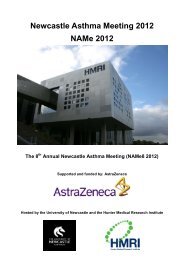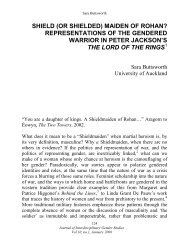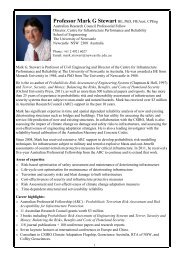n - University of Newcastle
n - University of Newcastle
n - University of Newcastle
Create successful ePaper yourself
Turn your PDF publications into a flip-book with our unique Google optimized e-Paper software.
ATt~i~zernls.<br />
One,'gaiil; 'tmo,'gudjal; 'three,' warh-lea&; 'foul;'gud-<br />
jal-gudj a1 ; 'five' is marh-j in biga, ' half the hancls'; ' ten'<br />
is b elli-belli m a r 11 j in La ga, ' the hand on either sicle.'<br />
In reckoning time the natives say 'sleeps ' £01- days, and<br />
' summers and winters ' for years. There is no Article.<br />
3. Paoxou~s.<br />
Tlie proilouns must be czrefully rrsecl, for a very sligllt change<br />
in the termination <strong>of</strong> any one <strong>of</strong> them will alter ahogether the<br />
force ancl meaning <strong>of</strong> a sentence.<br />
The 21ersonccl yronoz~ns are :--<br />
Singzblctr. Plural.<br />
Gacljo or kanya, ' I.' Gala-ta, ' we.'<br />
N'yundo or ginni, ' thou.' ?7'yura~, ' ye.'<br />
Eal, 'he, she, it.' Balgun, 'they.'<br />
They are thus declined :-<br />
Singz~lc~r.<br />
i?tT0712.<br />
G'en.<br />
Dcct.<br />
1st.<br />
I Gaclj o<br />
1 Ganya<br />
Gannalik<br />
Ganna<br />
2nd.<br />
N'yundo<br />
{ Ginni<br />
Nyunnolik<br />
N'yuimo<br />
3rd.<br />
Ba16k<br />
Ralik<br />
BCCZG. Ganyain Ginnin Balin<br />
Abl.<br />
Plz~ral.<br />
Balil<br />
iITol~z. Galata N'yurag Balgun<br />
Gen.<br />
Bat.<br />
Acc.<br />
dbl.<br />
Gaiuiliik<br />
Gailnilik<br />
Gannil (-in)<br />
Gallililil<br />
N'yuragik<br />
N'yuragil<br />
K'ytu-akin<br />
N'yuragil<br />
Ealgui~ik<br />
Balgunik<br />
Balgnnin<br />
Balgunil ,<br />
There are thus two forms for the Sing. iVo91z. <strong>of</strong> the first and<br />
seconcl pronouns ; gad j o and n'y uncl o seem to be used with an<br />
active sense <strong>of</strong> the verb, but gall y a and gin11 i wit11 a passive<br />
sense ; for there is no passive fol-ln <strong>of</strong> the verb, and there is no<br />
verb ' to be'; gall y a and giilili are always used with a participle<br />
or an adjective ; g adj o ancl n'y undo are never so used.<br />
Exanz~~les <strong>of</strong> tl~eir zcse :-Gadjo cljinnag ' I see,' but ganya<br />
barclin, 'I amgoing:; gacljo dtan, 'I pierce,' but ganya &annauin,<br />
'I am eating.; gadjo burno dendagaga, 'I climbed a<br />
tree,' but ganya waugilhl bukkanaga, 'I mas bitten by a<br />
snake'; gailya windo, 'I an1 old'; ganya gbrra& 'I am<br />
angry.' Similarly for the seconcl pronouns ; as, n'punclo kat tidj,<br />
do you understand'? but yan ginni man-gauin, ' what are<br />
you talking about'? n'yundo naitjdk gabbi ganna a ~ . gan- a ;<br />
bru, 'why c?o you not fetcli me ~vater'? but ginni naitjik<br />
balin bumawin, 'why are yon beating rile"?. Ginni cljul,<br />
'yon are mickecl'; gillni goradda, 'you arc short. 'P<br />
--- D~tal-- -<br />
I st. 2nd. 3rd.<br />
Ayon2. I. Galli Nnbal Bula<br />
3. Galla N libal BuIala<br />
3. Gannik h'ubin Bulen.<br />
Another form <strong>of</strong> gannik is gannana.<br />
The foi-ms inarkecl nonz. 1 are used by brotllers and sisters or<br />
two friends closely related; nom. 3.' by parent ailcl cliild or by<br />
nephew ancl uncle ; nom. 3., by husband and wife or by two<br />
persons <strong>of</strong> different sexes aEectionately attached, or (&an n anaj<br />
by tn70 brothers-in-law.<br />
The Possessive Pro~zozcns are :-<br />
Ganna, 'my,' gennaltik, 'mine'; n'y unna, 'thy,' n'ynnnalik,<br />
~~'yuniialag, ' thine '; balak, balalkk, 'his, her, its,'<br />
gannilbk, 'our or ours'; n'yuragkk, 'your or yours'; balguni k,<br />
' their or theirs.' The Demonstrative Pronnzc?zs are :-N'y agga,<br />
'that,' 'those'; nidj a, ' this,' 'these.' The 17ztel.rogntive Provaozcns<br />
are:-Gailni, ' who '2 i.e., ' who are you '2 ,$ndo, ' mho '? i.e.,<br />
' who did that '? &anno$, ' milose '2<br />
4. VEBDS.<br />
The verbs in most common use are :-<br />
Arise-irabin Fight-bsbnclju<br />
lieat-bumn Plj--birdtig<br />
Eecome-abbin Go-barclo; TI-atto<br />
Bite-5ikkan Go away-liolbardo<br />
Break-talilian Hear-liatticlj<br />
Bring ; carry <strong>of</strong>f; take Pain-bililian<br />
away-barrag Pierce-dtan<br />
DIarry-liardo barrag See-cljim-tt& ; gan-gau<br />
Burn (fire)-bnrmrip<br />
Eury-bianan<br />
Carry-gagnu<br />
Sit-ginnan<br />
. Speak- an-gau<br />
Spear-gicIj il<br />
Cook-clukun<br />
Cry-mirag<br />
Stand-yugau<br />
Take-gagau<br />
Cry out-mirau Tear-j eran<br />
Dig-bian Tllrom-g~\-ardo<br />
Eat, clrinli -&anno ; nalgo. Tie-yutarn<br />
Pear-wnien Unclerstnnd-listtidj<br />
Walk-gannau.



